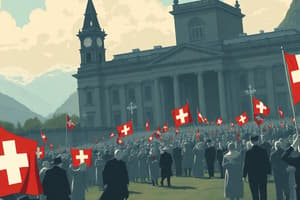Podcast
Questions and Answers
Which of the following is a shared tactic employed by both Hitler in 1933 and a hypothetical Trump in 2025 when aiming to consolidate power?
Which of the following is a shared tactic employed by both Hitler in 1933 and a hypothetical Trump in 2025 when aiming to consolidate power?
- Implementing universal healthcare and free college education to gain popular approval.
- Establishing a coalition government with opposition parties to foster unity.
- Immediately declaring war on neighboring countries to rally national support.
- Using propaganda and rhetoric to demonize minority groups and political opponents. (correct)
What is a key similarity between the political climates preceding Hitler's ascent to power in 1933 and a hypothetical Trump's return to power in 2025 that could facilitate the dismantling of democratic norms?
What is a key similarity between the political climates preceding Hitler's ascent to power in 1933 and a hypothetical Trump's return to power in 2025 that could facilitate the dismantling of democratic norms?
- A period of political polarization, economic instability, and distrust in established institutions. (correct)
- International alliances that strongly support democratic principles and human rights.
- Widespread economic prosperity and social equality, leading to complacency.
- A strong, unified opposition party capable of effectively challenging the leader's agenda.
How might a leader, like Hitler in 1933 or a hypothetical Trump in 2025, exploit existing legal frameworks to subvert democratic processes?
How might a leader, like Hitler in 1933 or a hypothetical Trump in 2025, exploit existing legal frameworks to subvert democratic processes?
- By enacting emergency decrees and legislation that expand executive power while curtailing civil liberties. (correct)
- By fostering open dialogue and collaboration with independent media outlets.
- By strictly adhering to constitutional limits and respecting the separation of powers.
- By promoting transparency and accountability in government operations.
In what way could the use of mass rallies and propaganda, similar to those employed by Hitler, be utilized by a hypothetical Trump in 2025 to gain and maintain power?
In what way could the use of mass rallies and propaganda, similar to those employed by Hitler, be utilized by a hypothetical Trump in 2025 to gain and maintain power?
Which of the following actions represents a potential parallel between Hitler's actions in the 1930s and a hypothetical Trump administration in 2025 regarding the treatment of political opponents?
Which of the following actions represents a potential parallel between Hitler's actions in the 1930s and a hypothetical Trump administration in 2025 regarding the treatment of political opponents?
How might the erosion of public trust in media outlets contribute to the rise of authoritarianism, as seen in Hitler's Germany and potentially in a hypothetical Trump scenario in 2025?
How might the erosion of public trust in media outlets contribute to the rise of authoritarianism, as seen in Hitler's Germany and potentially in a hypothetical Trump scenario in 2025?
What role could the appointment of loyalists to key positions within government and the judiciary play in dismantling democratic checks and balances, as witnessed in Nazi Germany and potentially in a hypothetical Trump administration?
What role could the appointment of loyalists to key positions within government and the judiciary play in dismantling democratic checks and balances, as witnessed in Nazi Germany and potentially in a hypothetical Trump administration?
Which of the following best describes how a leader, drawing parallels to behaviors exhibited by Hitler, might use nationalistic rhetoric to consolidate power in a contemporary setting like a hypothetical Trump administration in 2025?
Which of the following best describes how a leader, drawing parallels to behaviors exhibited by Hitler, might use nationalistic rhetoric to consolidate power in a contemporary setting like a hypothetical Trump administration in 2025?
How might the suppression of dissent and the restriction of free speech, mirroring tactics used by Hitler, manifest in a hypothetical Trump administration in 2025 aiming to consolidate authority?
How might the suppression of dissent and the restriction of free speech, mirroring tactics used by Hitler, manifest in a hypothetical Trump administration in 2025 aiming to consolidate authority?
What is a potential consequence of the normalization of political violence and the erosion of democratic norms, as evidenced by historical events and potentially mirrored in a hypothetical Trump administration in 2025?
What is a potential consequence of the normalization of political violence and the erosion of democratic norms, as evidenced by historical events and potentially mirrored in a hypothetical Trump administration in 2025?
Flashcards
Rhetorical Similarities
Rhetorical Similarities
Both leaders employed strong, nationalistic language to appeal to their base and demonize opponents.
Democracy Concerns
Democracy Concerns
Both leaders faced accusations of undermining democratic norms and institutions.
Study Notes
- The comparison focuses on the similarities between Adolf Hitler's ascent to power in 1933 and a hypothetical rise to power by Donald Trump in 2025, specifically regarding the dismantling of democratic institutions and the use of rhetoric.
Dismantling Democracy
- Both Hitler in 1933 and a hypothetical Trump in 2025 are viewed as potential threats to democratic institutions.
- Hitler utilized legal and quasi-legal means to consolidate power, a strategy that could be mirrored in a contemporary context.
- The Reichstag Fire Decree in 1933, which suspended civil liberties, serves as a historical example of how a crisis can be exploited to undermine democratic norms.
- A hypothetical Trump administration in 2025 might seek to exploit existing legal loopholes or engineer crises to expand executive power.
- The Enabling Act of 1933, which granted Hitler dictatorial powers, exemplifies the rapid erosion of parliamentary oversight.
- Concerns exist that a future Trump administration could disregard or circumvent legal constraints, potentially weakening checks and balances.
- The "Gleichschaltung" process, which brought various aspects of German society under Nazi control, illustrates the comprehensive nature of authoritarian consolidation.
- A similar concern exists that a future Trump administration might attempt to exert greater control over governmental institutions, the media, and other sectors of society.
- The establishment of concentration camps and the suppression of political opposition in Nazi Germany demonstrate the consequences of unchecked power.
- Critics worry that a future Trump administration could use the machinery of the state to target political opponents and suppress dissent.
- The systematic disenfranchisement of minority groups under Nazi rule serves as a cautionary tale about the potential for discriminatory policies.
- There are fears that a future Trump administration might implement policies that disproportionately harm minority groups or restrict their rights.
- The packing of courts with loyalists in Nazi Germany undermined the independence of the judiciary and ensured favorable legal outcomes for the regime.
- Similar concerns exist that a future Trump administration might attempt to politicize the judiciary and undermine its role as an impartial arbiter.
- The use of propaganda and censorship by the Nazi regime to control information and shape public opinion highlights the importance of media freedom.
- Critics worry that a future Trump administration might attempt to undermine the credibility of the media or restrict its access to information.
- The erosion of trust in democratic institutions under Nazi rule paved the way for authoritarianism.
- There is concern that a future Trump administration could further erode public trust in government, making it easier to implement undemocratic policies.
- The failure of other political actors to effectively resist Hitler's rise to power underscores the importance of vigilance and resistance in the face of authoritarianism.
- Many believe that it is crucial for political leaders, civil society organizations, and ordinary citizens to actively resist any attempts to undermine democratic norms and institutions.
Rhetoric
- Hitler's use of nationalism, populism, and scapegoating to mobilize support is a recurring theme in discussions about authoritarianism.
- Trump's rhetoric has been compared to that of historical demagogues, raising concerns about the potential for incitement and division.
- Hitler's exploitation of economic grievances and social anxieties to gain support offers lessons about the power of populist appeals.
- A hypothetical Trump administration in 2025 could similarly capitalize on economic anxieties and social divisions to maintain power.
- The use of propaganda and disinformation by the Nazi regime to manipulate public opinion serves as a reminder of the dangers of fake news and conspiracy theories.
- Some worry that a future Trump administration could continue to spread disinformation and conspiracy theories to undermine trust in institutions and promote its agenda.
- Hitler's demonization of minority groups and political opponents contributed to a climate of fear and intolerance.
- There are concerns that a future Trump administration could further demonize minority groups and political opponents, leading to increased polarization and violence.
- The use of emotional appeals over rational arguments was a key feature of Nazi propaganda.
- A similar concern exists that a future Trump administration might rely heavily on emotional appeals and disregard factual information.
- The creation of an "us versus them" narrative was central to Hitler's strategy of uniting his supporters against common enemies.
- Critics worry that a future Trump administration could further amplify divisions within society and create an "us versus them" mentality.
- The repetition of simple slogans and messages was used by the Nazi regime to reinforce its ideology.
- A similar concern exists that a future Trump administration might rely on repetition and simplistic messaging to promote its policies and discredit its opponents.
- Hitler's charisma and ability to connect with ordinary people played a significant role in his rise to power.
- Many acknowledge that Trump's charisma and communication skills have been instrumental in his political success.
- The normalization of extremist views under Nazi rule highlights the dangers of tolerating hate speech and intolerance.
- There is concern that a future Trump administration could further normalize extremist views and embolden hate groups.
- The erosion of public discourse and the suppression of dissent under Nazi rule demonstrate the importance of free speech and open debate.
- Critics worry that a future Trump administration could attempt to stifle dissent and limit freedom of expression.
Studying That Suits You
Use AI to generate personalized quizzes and flashcards to suit your learning preferences.




